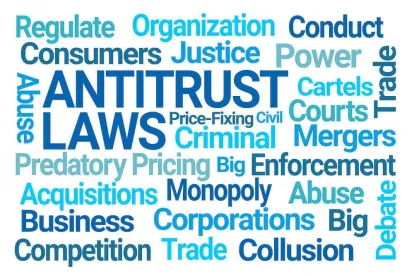In November 2019, the Department of Justice formed the Procurement Collusion Strike Force (“PCSF”) to focus the government’s enforcement resources on “deterring, detecting, investigating and prosecuting antitrust crimes, such as bid-rigging conspiracies and related fraudulent schemes, which undermine competition in government procurement, grant and program funding.” Over the years, we have represented a number of government contractors in antitrust investigations. Almost always, at the center of the investigation was a teaming agreement where parties agreed to combine their resources to pursue opportunities in the public procurement space that attracted scrutiny.
A recent complaint to block a merger suggests that scrutiny of teaming agreements by the PCSF may ramp up considerably. On June 29, 2022, DOJ filed a lawsuit to enjoin Booz Allen Hamilton Corp. from merging with EverWatch Corp. While lawsuits to block M&A transactions are nothing new, there are a couple noteworthy aspects of this case. First, the government claims the proposed merger would violate Section 1 of the Sherman Act, which provides for criminal liability. Second, DOJ asserts that the relevant market where competition will be decreased is a single procurement being conducted by National Security Agency.
DOJ’s positions are noteworthy because in the government procurement space collaborations among competitors are much more common than in the commercial marketplace. This difference is driven by several factors, including the sheer size of some government procurements that require resources from multiple companies to satisfy voluminous requirements, as well as statutory directives mandating small business, and other company participation. Thus, teaming agreements are a staple in the public procurement space. And, teaming agreements are so commonplace that many companies enter into them with limited or no legal input.
Importantly, the government as your customer views teaming agreements very differently than the government as your antitrust regulator. The Federal Acquisition Regulation (“FAR”) expressly contemplates contractor team arrangements and announces a policy that “[t]he Government will recognize the integrity and validity of contractor team arrangements; provided, the arrangements are identified and company relationships are fully disclosed in an offer or, for arrangements entered into after submission of an offer, before the arrangement becomes effective. The Government will not normally require or encourage the dissolution of contractor team arrangements.” FAR 9.603. Notably, there is very little guidance provided to contracting officers and many customers are happy to trade the benefits of increased competition for a more robust team.
In our previous experience, DOJ usually has not focused on individual procurements. That is, DOJ initiated investigations into teaming agreements that called for combining on several opportunities, as opposed to a single procurement, and limited competition more broadly in the marketplace. The DOJ’s position in the Booz Allen case, however, suggests a shift in that focus towards individual procurements, which could subject limited teaming agreements to scrutiny. And unlike the posture of a transaction where DOJ has an opportunity to object prospectively, DOJ may second guess an otherwise satisfied procuring agency through increased enforcement.
While the PCSF has not announced any specific initiative, and there are certainly some unique facts associated with the Booz Allen/EverWatch merger, the positions DOJ have taken in that case should put contractors and grantees on notice that they would be well served in being thoughtful in their teaming arrangements.




 />i
/>i

